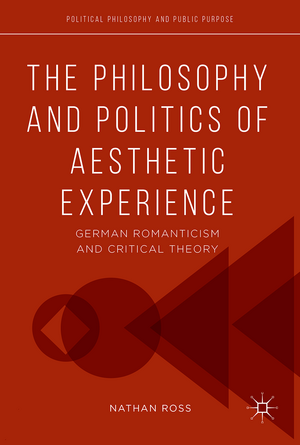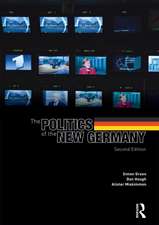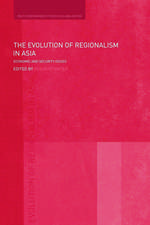The Philosophy and Politics of Aesthetic Experience: German Romanticism and Critical Theory: Political Philosophy and Public Purpose
Autor Nathan Rossen Limba Engleză Hardback – 18 apr 2017
| Toate formatele și edițiile | Preț | Express |
|---|---|---|
| Paperback (1) | 624.26 lei 6-8 săpt. | |
| Springer International Publishing – 8 mai 2018 | 624.26 lei 6-8 săpt. | |
| Hardback (1) | 629.52 lei 6-8 săpt. | |
| Springer International Publishing – 18 apr 2017 | 629.52 lei 6-8 săpt. |
Din seria Political Philosophy and Public Purpose
- 20%
 Preț: 689.87 lei
Preț: 689.87 lei - 15%
 Preț: 697.18 lei
Preț: 697.18 lei -
 Preț: 379.96 lei
Preț: 379.96 lei -
 Preț: 374.30 lei
Preț: 374.30 lei - 15%
 Preț: 629.38 lei
Preț: 629.38 lei - 15%
 Preț: 627.11 lei
Preț: 627.11 lei -
 Preț: 375.81 lei
Preț: 375.81 lei - 18%
 Preț: 1379.83 lei
Preț: 1379.83 lei - 18%
 Preț: 876.34 lei
Preț: 876.34 lei - 18%
 Preț: 927.07 lei
Preț: 927.07 lei -
 Preț: 411.96 lei
Preț: 411.96 lei - 15%
 Preț: 490.62 lei
Preț: 490.62 lei - 18%
 Preț: 768.61 lei
Preț: 768.61 lei - 15%
 Preț: 576.47 lei
Preț: 576.47 lei - 15%
 Preț: 571.66 lei
Preț: 571.66 lei -
 Preț: 417.03 lei
Preț: 417.03 lei - 18%
 Preț: 871.41 lei
Preț: 871.41 lei - 15%
 Preț: 625.52 lei
Preț: 625.52 lei - 18%
 Preț: 764.58 lei
Preț: 764.58 lei - 18%
 Preț: 706.73 lei
Preț: 706.73 lei - 18%
 Preț: 767.64 lei
Preț: 767.64 lei - 18%
 Preț: 773.98 lei
Preț: 773.98 lei - 18%
 Preț: 714.91 lei
Preț: 714.91 lei - 18%
 Preț: 767.51 lei
Preț: 767.51 lei - 18%
 Preț: 877.75 lei
Preț: 877.75 lei -
 Preț: 383.16 lei
Preț: 383.16 lei -
 Preț: 377.51 lei
Preț: 377.51 lei -

Preț: 629.52 lei
Preț vechi: 740.61 lei
-15% Nou
Puncte Express: 944
Preț estimativ în valută:
120.50€ • 126.35$ • 99.56£
120.50€ • 126.35$ • 99.56£
Carte tipărită la comandă
Livrare economică 30 ianuarie-13 februarie 25
Preluare comenzi: 021 569.72.76
Specificații
ISBN-13: 9783319523033
ISBN-10: 3319523031
Pagini: 248
Ilustrații: XV, 253 p.
Dimensiuni: 148 x 210 x 16 mm
Greutate: 0.48 kg
Ediția:1st ed. 2017
Editura: Springer International Publishing
Colecția Palgrave Macmillan
Seria Political Philosophy and Public Purpose
Locul publicării:Cham, Switzerland
ISBN-10: 3319523031
Pagini: 248
Ilustrații: XV, 253 p.
Dimensiuni: 148 x 210 x 16 mm
Greutate: 0.48 kg
Ediția:1st ed. 2017
Editura: Springer International Publishing
Colecția Palgrave Macmillan
Seria Political Philosophy and Public Purpose
Locul publicării:Cham, Switzerland
Cuprins
1. Introduction.- 2. Aesthetic Semblance and Play as Responses to the Disfigurement of Human Social Existence in Schiller’s Aesthetic Education.- 3. Aesthetic Experience at the Limits of Thought in Hölderlin’s New Letters on Aesthetic Education.- 4. The Endless Pursuit of Universal Sense in Friedrich Schlegel’s Political and Aesthetic Thought.- 5. Walter Benjamin’s Philosophy of Critical Experience—From the Romantic Artwork to the Disillusioning of Mimesis.- 6. Aesthetic Truth as the Mimesis of False Consciousness in Adorno’s Aesthetic Theory.- 7. Conclusion: The Benjamin–Adorno Debate on the Nature of Aesthetic Experience.
Notă biografică
Nathan Ross is Associate Professor of Philosophy at Oklahoma City University. His first book, On Mechanism in Hegel's Social and Political Philosophy, was published in 2008. He has published essays in Philosophy Today, The Graduate Faculty Philosophy Journal, and Epoché, and an edited volume on the aesthetic philosophies of Benjamin and Adorno.
Textul de pe ultima copertă
This book develops a philosophy of aesthetic experience through two socially significant philosophical movements: early German Romanticism and early critical theory. In examining the relationship between these two closely intertwined movements, we see that aesthetic experience is not merely a passive response to art—it is the capacity to cultivate true personal autonomy, and to critique the social and political context of our lives. Art is political for these thinkers, not only when it paints a picture of society, but even more when it makes us aware of our deeply ingrained forms of experience in a transformative way. Ultimately, the book argues that we have to think of art as a form of truth that is not reducible to communicative rationality or scientific knowledge, and from which philosophy and politics can learn valuable lessons.
Caracteristici
Makes a compelling argument that aesthetics revolve around not only the experience of the beautiful, but also knowledge and morality, and thus has implications for politics Provides a unique reading of the analytic and historical connection between early German Romanticism and early Frankfurt School Critical Theory Traces shared political commitments and philosophical concerns of thinkers such as Kant, Schiller, Hölderlin, Schlegel, Benjamin, and Adorno











